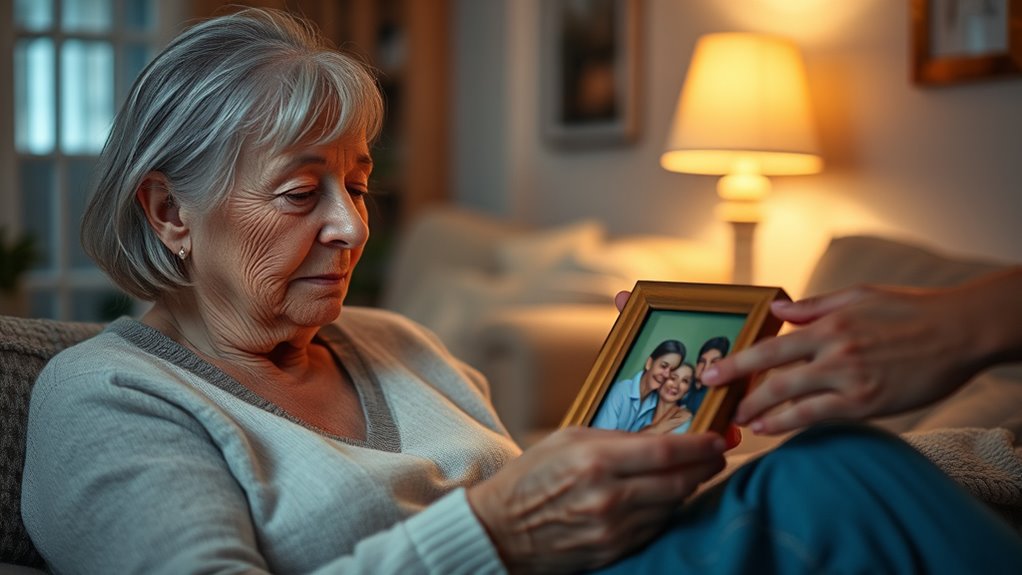To cope with sundowning in Alzheimer’s patients, establish a consistent, calming bedtime routine with familiar activities like bathing or gentle music to create stability. Make your environment safe and soothing, with soft lighting, reduced noise, and clear visual cues to help orient them. Maintaining a predictable schedule and minimizing overstimulation can reduce confusion and agitation. Want simple steps to create a more peaceful space? Keep exploring to discover more helpful strategies.
Key Takeaways
- Establish a consistent, calming bedtime routine with familiar activities to reduce anxiety and confusion.
- Use well-lit, clutter-free environments with nightlights to create a safe, non-overstimulating space.
- Incorporate visual cues like labels and familiar objects to aid orientation and decrease frustration.
- Minimize noise and overstimulation during evening hours to promote relaxation and sleep readiness.
- Ensure the environment is comfortable and safe, adjusting temperature and reducing distractions to manage symptoms effectively.

Sundowning is a common challenge for those with Alzheimer’s, often causing increased confusion, agitation, and restlessness as evening approaches. When you notice these behaviors worsening at dusk, it’s essential to develop strategies that help your loved one feel more secure and calm during this time. One effective way to do this is by establishing consistent bedtime routines. By sticking to a predictable schedule, you help create a sense of stability and reduce anxiety. For example, keep activities calm and familiar, such as gentle bathing, reading, or listening to soothing music. Avoid stimulating activities close to bedtime, as they can heighten agitation. Consistency in timing signals to the brain that it’s time to wind down, making the transition into sleep smoother.
Along with routines, environmental modifications can markedly reduce sundowning symptoms. The environment plays a vital role in how your loved one perceives and reacts to their surroundings. Bright, flickering lights or cluttered spaces can increase confusion and agitation. To combat this, ensure the living area is well-lit with soft, even lighting that minimizes shadows and glare. Use nightlights in hallways and bathrooms to prevent falls and reduce fear of the dark. Keep the environment calm by removing unnecessary clutter, which can be overwhelming for someone with Alzheimer’s. Soundproofing or reducing background noise can also help create a peaceful space, minimizing distractions that might trigger restlessness.
You should also consider visual cues to promote orientation. Clear signage, such as labels on doors or rooms, helps your loved one navigate more easily and reduces frustration. Maintaining a familiar, consistent environment can foster feelings of safety and familiarity, which are vital during sundowning episodes. Moreover, controlling temperature and avoiding overstimulation in the home can prevent discomfort that may lead to agitation. Creating a safe and predictable environment is key to helping your loved one remain calmer during these challenging hours.
Frequently Asked Questions
Are There Specific Medications to Reduce Sundowning Symptoms?
Yes, there are medication options to reduce sundowning symptoms, but you should always follow prescription guidelines. Doctors may prescribe antipsychotics, sedatives, or sleep aids, but these come with potential risks and should be used cautiously. Consult your healthcare provider to determine the safest and most effective medication plan for your loved one, ensuring proper monitoring and adjustments as needed to minimize side effects and improve their nighttime behavior.
How Can I Prevent Sundowning Episodes From Occurring?
To prevent sundowning episodes, focus on maintaining good sleep hygiene by establishing a consistent bedtime routine and limiting daytime naps. Use environmental modifications like bright lighting in the evening and minimizing noise to create a calming atmosphere. Keep a regular schedule for meals and activities, and avoid overstimulation late in the day. These strategies help regulate your loved one’s internal clock, reducing the likelihood of sundowning behaviors.
What Are Alternative Therapies to Manage Sundowning Behavior?
You can try alternative therapies like music therapy and aromatherapy to manage sundowning behavior. Music therapy helps soothe and reduce agitation by playing calming tunes or familiar songs. Aromatherapy using essential oils such as lavender or chamomile can promote relaxation and ease anxiety. Incorporate these therapies into your loved one’s routine, creating a calming environment that may lessen sundowning episodes and improve their overall comfort and well-being.
How Does Diet Influence Sundowning in Alzheimer’s Patients?
Diet can considerably influence sundowning in Alzheimer’s patients through nutritional strategies and dietary adjustments. You should focus on providing a balanced diet rich in fruits, vegetables, lean proteins, and whole grains to stabilize blood sugar levels and promote better sleep. Limiting caffeine and sugar intake, especially in the late afternoon and evening, helps reduce agitation. Proper hydration and small, frequent meals can also prevent blood sugar dips that worsen sundowning symptoms.
Can Physical Activity Help Lessen Sundowning Symptoms?
Yes, physical activity can help lessen sundowning symptoms. You should encourage your loved one to follow regular exercise routines and participate in outdoor activities during the day. This helps regulate their sleep-wake cycle, reduces agitation, and promotes relaxation in the evening. Consistent movement, especially outdoors, exposes them to natural light, which can further improve their circadian rhythm and decrease sundowning behaviors.
Conclusion
By understanding and implementing these strategies, you can turn chaos into calm and bring peace to your loved one’s evenings. Remember, your patience and compassion are more powerful than any medication or intervention. When you stay calm and consistent, you hold the key to transforming the toughest sundowning nights into moments of connection and comfort. Your unwavering support can be the lighthouse guiding them through the storm — because in these moments, your care truly holds the weight of the world.









